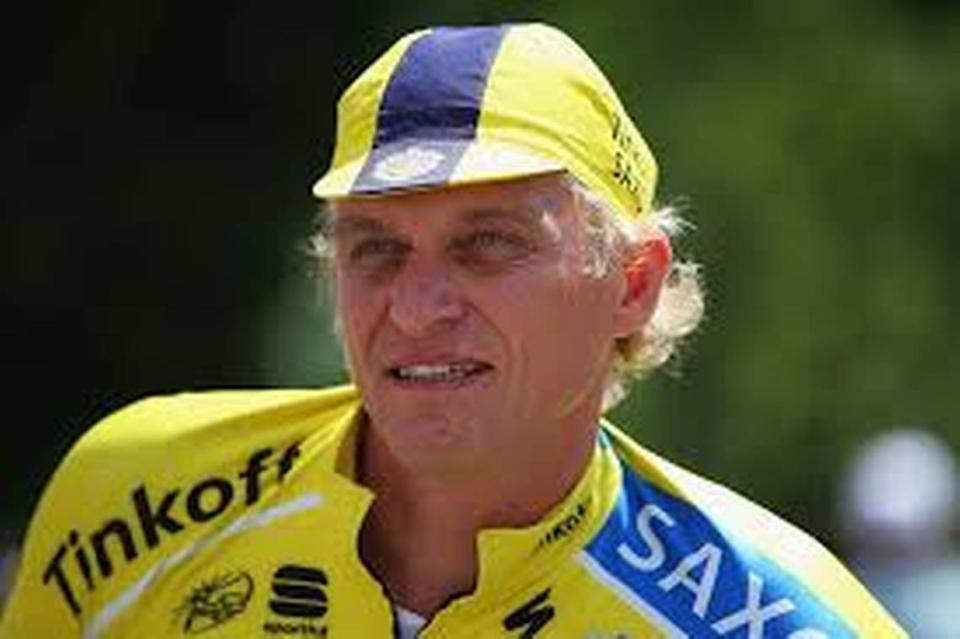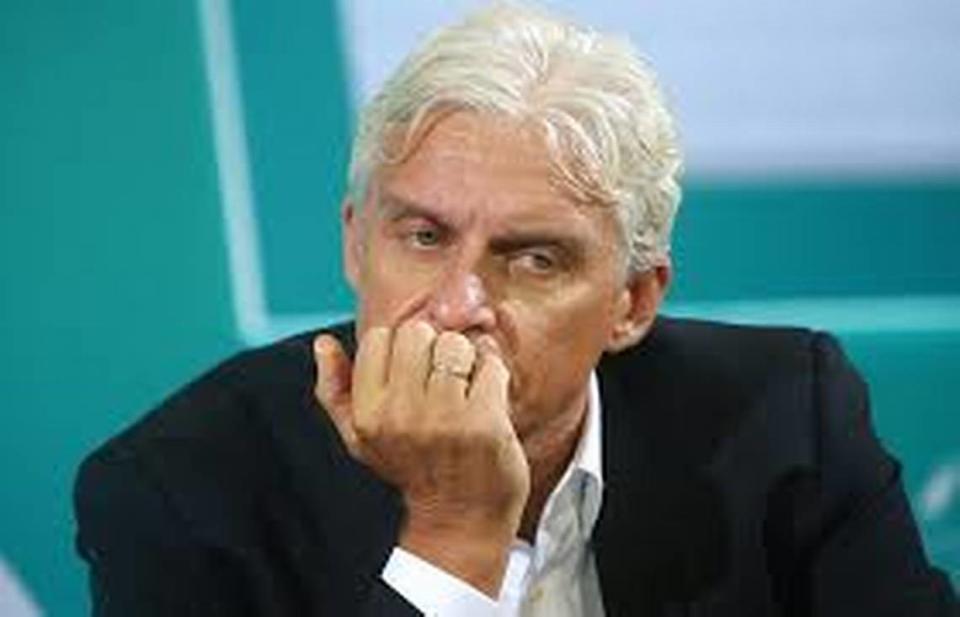Document leak reveals scope, audacity of Russian banking billionaire’s alleged IRS ripoff
A recent arrest in London and a new leak of documents from a bank in the Cayman Islands provide a road map showing how a Russian oligarch allegedly defrauded the United States out of hundreds of millions in taxes, undertook luxury, prestige projects and played a financial shell game using offshore companies to buy and sell private jets.
The case of Oleg Tinkov is the latest to highlight the advantages of opaque limited liability corporations and obscure offshore tax havens like the British Virgin Islands and the Isle of Man, a self-governing British Crown dependency between Great Britain and Ireland and known for its medieval castles, to avoid taxes. And how recent document leaks are bringing about a reckoning.
The alleged tax fraud comes straight out of an indictment, handed up in California.
The leaked documents — which were provided to the Justice Department but have not resulted in additional charges — tell the rest of the story, underscoring how allegedly ill-gotten profits can be further shielded by rotating them through a series of offshore accounts, all under the same control, in effect a financial game of three card monte.
That current financial reckoning began with the publication of the Panama Papers, a leak of confidential documents from Mossack Fonseca, a Panamanian-based law firm that serviced offshore corporations, and has continued through a series of subsequent leaks
In September 2019, a federal grand jury in California indicted Tinkov (also known as Tinkoff) on a charge of “filing false tax returns” while a resident of the state and described how he “allegedly concealed $1 billion in assets and income” in 2013. The indictment remained sealed until March 2020.
The indictment alleges that Tinkov used several British Virgin Islands shell companies — referred to as a “BVI structure” — to conceal his assets.
A massive cache of emails, financial records and other documents from a Cayman Islands bank, the Cayman National Bank and Trust, made public by a hacker who goes by the name of Phineas Fisher, reveals that Tinkov made use of at least one of the named companies in the BVI structure — Beckett Group — to buy private jets from French aviation giant Dassault and set up a complex arrangement through shell companies to avoid paying taxes.
Together with documents from legal firm Appleby and financial services provider Estera that were leaked to the International Consortium of Investigative Journalists in 2017 as part of “the Paradise Papers,” a follow-up to the Panama Papers, the Caymans leak and the California indictment provide a clear glimpse into how the world’s financial elite take advantage of offshore jurisdictions.
A document found in the Caymans leak also shows that the bank had handed over Tinkov’s financials and other information to the U.S. Justice Department.
Oleg Tinkov declined to comment on the matter, as did the Justice Department and the Internal Revenue Service.
Rags to Riches
The son of a Siberian miner and a seamstress, Oleg Tinkov arrived in the United States, according to his autobiography, in 1993 to visit a friend in California who had a green card. He eventually bought a house in Santa Rosa and set up a business that exported American goods to Russia. He later settled in San Francisco and obtained U.S. citizenship in 1996.
After a series of business ventures involving, variously, electronic goods, frozen foods and beer, Tinkov finally settled on Tinkoff Credit Systems (later renamed Tinkoff Bank), a Moscow-based digital bank with no branches that he founded in 2006.
Tinkoff Credit Systems went public on the London Stock Exchange on Oct. 25, 2013, making Tinkov the owner of more than $1 billion worth of the bank’s shares. Three days later, he renounced his U.S. citizenship.
American citizens must pay an “exit tax” when they relinquish citizenship. The tax is calculated as if the individual sold all his or her assets on the day before he expatriated and had to report the gain.
According to the indictment, Tinkov’s final tax return “did not include any gain and income arising from the constructive sale of his property related to his expatriation” and he reported that his “total income was $205,317” even though Forbes had estimated his net worth to be $700 million in March that same year.

Already rich before Tinkoff Credit’s IPO, Tinkov became a billionaire. Partly aided by the self-engineered tax cut and with a fortune that had grown to $1.8 billion by December that year, he undertook a series of prestige projects.
A longtime cycling aficionado, Tinkov had sponsored European professional cycling teams since 2006. In December 2013, he outright bought a team he previously co-sponsored, Saxo-Tinkoff, and renamed it Tinkoff.
In 2016 he inaugurated a chain of luxury resorts called “La Datcha” with the opening of two chalets in ski towns in the French Alps. These were followed by a Tuscan palazzo in Italy, a fishing resort by the Volga river in Astrakhan, Russia, and a beachfront hacienda-style resort in Cabo San Lucas, Mexico. The project also boasts a luxury ice-breaking yacht that takes passengers on cruises in Southeast Asia, the Pacific Islands, Antarctica, the Kamchatka peninsula and the Arctic.
Tinkoff Credit Systems also sponsored a Depeche Mode concert in Moscow in 2018 and since 2020 is the chief sponsor of Russia’s top-flight domestic soccer league.
The devil in the details
The California indictment says that Tinkov was the majority shareholder of Tinkoff Credit Systems through three British Virgin Island entities, among them Beckett Group Ltd.
Leaked documents show that Beckett was incorporated in April, 2011, and owned by Vadim Stasovskiy, a board member and shareholder of Tinkoff Credit Systems. Stasovskiy handed over full control of Beckett to Tinkov in April, 2013 — just six months before Tinkov relinquished American citizenship.
A compliance review carried out by Cayman National Bank that came with the leaked cache states that Stark Limited, an Isle of Man firm controlled by Beckett, opened an account at the bank on June 24, 2014. The Isle of Man, like the Cayman Islands and the British Virgin Islands, is considered a tax haven where corporations seek to shield their profits.
Other leaked documents show that in September 2014 two loan agreements — worth $5.5 million and $10 million — were made between Moonfield Trading, a British Virgin Islands company, and Stark Limited for the purchase of two corporate jets, a Falcon 5X and a Falcon 900LX.
The agreements also state that on July 22, 2014, only a month after Stark opened its Caymans account, Moonfield paid Dassault, the manufacturer of the airplanes, the entirety of the $10 million for the second aircraft and an advance amount of $2 million for the first.
A January 2018 email that came with the leaks shows that Stark sold the Falcon 900LX and bought a new airplane, a Falcon 7X, in 2016. According to other leaked documents, a similar loan arrangement for $10 million was made between the two companies in May 2016 for the purchase of the third aircraft. The agreement states that in November 2015, Moonfield paid Dassault the entirety of that amount on behalf of Stark.
All three of these loan agreements were facilitated by Appleby, the law firm at the center of the Paradise Papers. Leaked documents show that the ultimate owner of Moonfield is also Oleg Tinkov.
Amid the cache of leaked documents is also a lease agreement dated Dec. 6, 2013, between Stark and Moonfield for a fourth aircraft, a Dassault Falcon 2000LX. The agreement states that Moonfield will pay Stark $871,000 (in 2013 U.S dollars) per quarter for five years, with the option to renew, for leasing the plane from Stark. News reports suggest that he had bought this airplane before Tinkoff Credit Systems’ IPO in London.
The three loans for the new airplanes and the lease agreement for the fourth aircraft allowed Tinkov to set up a complex three-way arrangement where money flowed from a Moscow account at Tinkoff Credit Systems and then shuttled between Moonfield and Stark — firms also owned by him.

Analysis of transaction data from the leaked documents by McClatchy’s European partners shows that Stark received 7.97 million euros, roughly $8 million (in 2016 U.S. dollars), in “advanced rental payments” from Moonfield between July 2014 and January 2018. The same was sent straight back to the BVI company as loan repayments, with the remainder spent on fees.
The average gap between Stark receiving a payment and sending back the balance was just a week — in one case, the money stayed in Stark’s account for less than 24 hours — and in almost every case the payment reference for both transactions named Moonfield as the sender or recipient.
As Cayman National’s banking director put it in an internal email, the structure was “effectively a ‘pass through’ account.”
By operating as a leasing company, Stark could claim to offset the value added tax that would otherwise be due on the purchase of the jet when it entered the Isle of Man. Unlike other jurisdictions, where VAT must be paid and then claimed back at a later date, the Isle of Man effectively allows importers not to pay any tax in the first place.
While setting up and using such a structure is not illegal in itself, since both Moonfield and Stark were owned by Tinkov, it allowed him to evade what could have been a multimillion-dollar tax liability in the United States or any other country.
“It is reasonable to conclude that the offset procedure was used,” said Jolyon Maugham QC, a British tax expert, when presented with the leaked information by McClatchy’s European reporting partners.
“A number of features of the arrangements — for example, the use of the Isle of Man as a place of importation; the circular payments comprising a loan from Moonfield to Stark, lease payments from Moonfield to Stark, and the return of the sums of those lease payments by loan repayments from Stark to Moonfield; and indeed the leasing arrangements themselves — are difficult otherwise to rationalize.”
He concluded that it is “reasonable to say that there has been tax avoidance.” Avoidance of taxes is not necessarily a crime.
An email dated Dec. 13, 2017, notes that the funds from Moonfield Trading that were being deposited to Stark Limited’s bank account were originating from a Tinkoff Bank account in Russia.

Moreover, the email states that these funds were then being funneled “out in a matter of days” to an account in Moonfied’s name at ABLV Bank in Latvia. This is confirmed by financial statements for Stark that came with the leaks.
Now liquidated, the Latvian Bank had been sanctioned by the Treasury Department for facilitating billions out of Moldova, a landlocked eastern European country bordering Romania and Ukraine, and doing business with shell companies tied to North Korea’s nuclear missile program. The Treasury invoked the Patriot Act and cut off its access to United States currency, effectively freezing the bank out from the world’s financial system.
A spokesperson for Cayman National declined to comment on Tinkov’s account, and went on to say that the bank no longer accepts Russian clients.
Tinkov is presently fighting extradition to the United States in a London court.
This story was reported in collaboration with the Europe-based investigative nonprofit, Organized Crime and Corruption Reporting Project (OCCRP).

